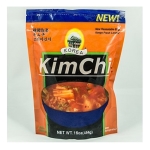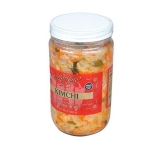Health magazine ranks kimchi as one of the world’s 5 healthiest foods. It’s a traditional fermented cabbage dish first made in Korea, but now consumed all over the world for its delicious taste and long list of health benefits, including improved digestion and immune system boosting properties.
How is Kimchi Made?
Kimchi couldn’t be easier to make, though dialing in a recipe that works can take time. It starts with a mixture of red cabbage, vinegar, garlic, red chili, ginger, salt, and a variety of spices (depending on manufacturer and/or consumer preference). Radishes are also often added, particularly in traditional Korean recipes.
The cabbage is chopped into bit-sized pieces, and then everything’s mixed together. Next, the kimchi is put into an airtight glass jar, such as a mason jar, to ferment for a minimum of two weeks. The longer it ferments, the more potent the health benefits become.
As the mixture sits glass-sealed in a dark space, in the absence of oxygen, natural bacteria in the cabbage begin to consume the sugars contained within it and the other ingredients, thus forming the probiotic cultures that makes this food so wholesome and wonderfully healthy.
Kimchi Nutritional Profile
Kimchi can vary somewhat in its nutritional profile. The quality of cabbage used is important – ie., how fresh it was before the fermentation process was started. You also have to ensure you’re eating kimchi made from red cabbage, as is the case with traditional Korean kimchi.
Each ½ cup (280 gram) serving of kimchi contains approximately:
• Calories: 96
• Fiber: 2 grams.
• Protein: 3 grams.
• Fat: 1 gram.
• Carbohydrates: 20 grams.
• Vitamin A: 45% D.V.
• Vitamin K: 26% D.V.
• Manganese: 25% D.V.
• Vitamin C: 23% D.V.
• Vitamin B6: 13% D.V.
• Iron: 12% D.V.
Top 5 Kimchi Brands
#1 |
NongShim Bowl Noodle, Kimchi | More Info |
#2 |
Korea KimChi | More Info |
#3 |
Gold Mine Organic Fresh Raw Kimchi | More Info |
#4 |
Seoul Kimchi Original | More Info |
#5 |
Mother’s in Law Kimchi | More Info |
Benefits of Consuming Kimchi Regularly
1. Probiotic Wellness (Gut Health)
The fermentation process creates a proliferation of beneficial bacteria. Bacteria that our gut uses to maintain balance in our intestinal flora. One of the most important is probiotic lactic acid bacteria. When digested, these bacteria reside in our intestines and consume thousands of different strains of damaging bacteria that feed on the glucose and essential nutrients digested from our food.
Probiotics aid the immune system in fighting off infection, along with preventing gastrointestinal disorders like ulcerative colitis, Chron’s disease, diarrhea, candida, and a variety of problems associated with consuming antibiotics.
2. Immune Booster
Due to the presence of so many probiotics, plus antioxidants like vitamin’s A and C, and glutathione precursors like selenium and manganese, kimchi has a huge immune system boosting effect when consumed regularly. Since red pepper is always part of any traditional kimchi recipe, the immune system also gets the antioxidant effects similar to those found in cayenne pepper.
In addition, kimchi contains ginger and garlic, which are both known for their immune-boosting and antioxidant effects. Kimchi also contains several biochemicals that protect against oxidation, including isothiocyanates and sulfide compounds.
Last, two grams of fiber per serving helps bulk stool in the bowels, and provides the healthy gut bacteria responsible for immune system function with the food they need to survive inside our bodies.
3. Cholesterol Lowering & Heart Disease Preventing
There are a number of factors responsible for poor cholesterol balance including poor genetics, prolonged high blood sugars, poor diet, and lifestyle factors such as alcoholism. While kimchi can’t help cure bad genetics, it can help with at least a few potential issues that create a cholesterol imbalance in the body.
Selenium, found in kimchi, has been shown to lower “bad” HDL cholesterol levels. Being a powerful antioxidant, selenium also works to prevent the oxidation of cholesterol and triglycerides – a process that leads to atherosclerosis and later coronary heart disease.
Garlic, another ingredient in kimchi, has plenty of fresh garlic cloves which contain a compound called allicin which also lowers HDL cholesterol and raises the good cholesterol called “LDL”. Finally, the more fiber you consume daily, the lower HDL cholesterol is in the blood.
4. Significant Source of Vitamin A
A half-cup serving of kimchi holds 45% daily value of vitamin A. Vitamin A is just one of the body’s preferred external antioxidant sources, responsible for ushering free radicals out of our system before they cause damage. The eyes in particular suffer from oxidative damage when vitamin A levels become low.
Getting enough vitamin A ensures multiple processes including DNA expression can flourish in the body.
5. Potential Cancer Preventative
This potential benefit is one that needs further exploration before people start taking kimchi in hopes of curbing their cancer risk. Basically, there are just as many sources currently that claim kimchi can increase the risk of cancer, as there are trusted sources that say it can decrease it.
Specifically, the studies out there currently relate to elevated risk of stomach (gastric) cancer when you consume too much kimchi. This Quora discussion pretty much sums up what most kimchi-loving-researchers currently believe, which is that most studies pointing to kimchi’s cancer risk target Koreans who often eat nitrite-rich diets including plenty of kimchi. Koreans eat so much kimchi, many families keep a dedicated refrigerator in their home just for storing the superfood, many consuming pounds daily.
Kimchi has elevated levels of nitrites, but the important distinction is that many traditional Korean foods also do – as do American and Japanese diets. Stomach cancer has been on the rise in the last few decades, but it also saw a dramatic decline at the start of the 19th century, and Koreans in particular have never stopped eating kimchi!
In general, eating too much can be just as bad as consuming none at all. Much like a glass of wine or beer every day is considered a healthy practice that boosts health, whereas two, three, etc., can hurt your health in multiple ways. Eating a half-cup serving or less per day of kimchi every day will give you all the benefits mentioned on this page, without the worry of increased cancer risk.
6. Healthy Skin & Hair
The selenium in kimchi spurs the production of glutathione which in turn preserves the vitamin C found in our diet. Vitamin C has a half-life of just 30 minutes after it’s ingested and the body isn’t able to store it as it’s a water-soluble vitamin.
It’s also one of the most important antioxidants we consume and essential for the health of skin and hair. Vitamin C, is essential for fighting the free radical damage that causes wrinkles and other defects in the skin. The healthy bacteria found in kimchi are also helpful at fighting skin conditions such as atopic dermatitis.
7. Anti Aging Effects
There’s a good reason why Koreans and other Asian cultures tend to age much more “gracefully” than Europeans and Americans do. It’s because these cultures like to eat so many fermented foods like kimchi. With all the antiobiotics kimchi contains, plus the probiotics and high fiber content, aging (ie., oxidation) is slowed significantly, especially when you dial the rest of your diet and lifestyle in to reduce the oxidative processes that cause it.
8. Antibiotic-Free H.Pylori Eliminator
The Helicobacter pylori strain of bacteria isn’t the good kind that health experts are telling you to get more of in your diet every day. In fact, this nasty little bug is the most common cause of peptic ulcers in the body. Kimchi contains leuconostoc mensenteroides which create dextrin. Dextrin leads the fight against H.pylori in the stomach.
9. Kimchi Prevents and Treats Constipation
With all that’s been discussed so far, it should be obvious that kimchi help to keep the bowels moving. In fact, like with any probiotics, kimchi can cause bowel movements to increase above what’s normal for you as it starts to clean your digestive tract. Constipation is rare when you’re getting plenty of the fiber and probiotics found in kimchi.
Potential Side Effects of Kimchi
1. Digestive Upset
The fiber and probiotics in kimchi can definitely cause digestive upset in some people. This side effect is noted more in the early stages of consuming the Korean superfood, but may persist in sensitive individuals. Start out eating small amounts to assess your tolerance and stop eating it completely if digestive issues like bloating, diarrhea, or excessive gas persist beyond the first week.
2. Blood Pressure
High blood pressure can exist for numerous reasons. If you and your doctor have identified sodium as one of the culprits causing high blood pressure in your body, you may want to consider low-sodium varieties of kimchi over the traditional kinds. This study shown a cause and effect relationship between consuming high sodium kimchi and raises in blood pressure – whereas the low sodium variety caused no increases in blood pressure and/or a lowering effect.
Our 3 Favorite Kimchi Brands
3. DIY Kimchi Kit Mother in Law’s

If you’re a do-it-yourselfer at heart, this handy kit from Mother-in-Law’s Kimchi is just what you need to get started. It offers instructions for how to make the best homemade kimchi and includes a 4 quart fermentation jar, premixed Korean starter sauce, chili flakes, and two age-old recipes to get started. All you need is some fresh cabbage, garlic, salt, and any other veggies or spices you wish to add to customize your own kimchi from the comforts of home.
2.Seoul Kimchi Original

Literally some of the most delicious kimchi you’ll ever put in your mouth! Seoul Kimchi Original is made fresh just for you when you order, packaged in a BPA free bag, and priority-shipped in a styrofoam-lined container with reusable ice pack to maintain peak freshness. They use the finest Napa cabbage, and offer an extra spicy version if your palate craves the burn! I recommend ordering this one in bulk and letting it cure and marinate for a week or two after it arrives (or more for more probiotic benefits).
1.Korea KimChi

This kimchi is a relatively new offering on Amazon, but don’t let that keep you from trying it. This kimchi is as traditional Korean as you’ll find anywhere and the reviews (mainly from actual Koreans) indicate it’s the real deal indeed. This product ships out in a sealed container with a reusable ice gel pack, just like the Seoul Kimchi does. Save ten cents an ounce by buying the four pack!
Conclusion
Kimchi has survived the test of time for improving digestive health, boosting the immune system, and a variety of other intrinsic benefits to human health. Millions of people worldwide now consume kimchi for its unique flavor profile, which compliments most meat, fish, and vegetable dishes, as well as making for a great standalone snack whenever the mood hits.
It’s important to be mindful of the warnings listed earlier and to ramp up your consumption slowly to avoid side effects like digestive upset and increased blood pressure. With that in mind, I can’t recommend kimchi enough as a natural source of healthful probiotics.
Here’s to your long term health!




